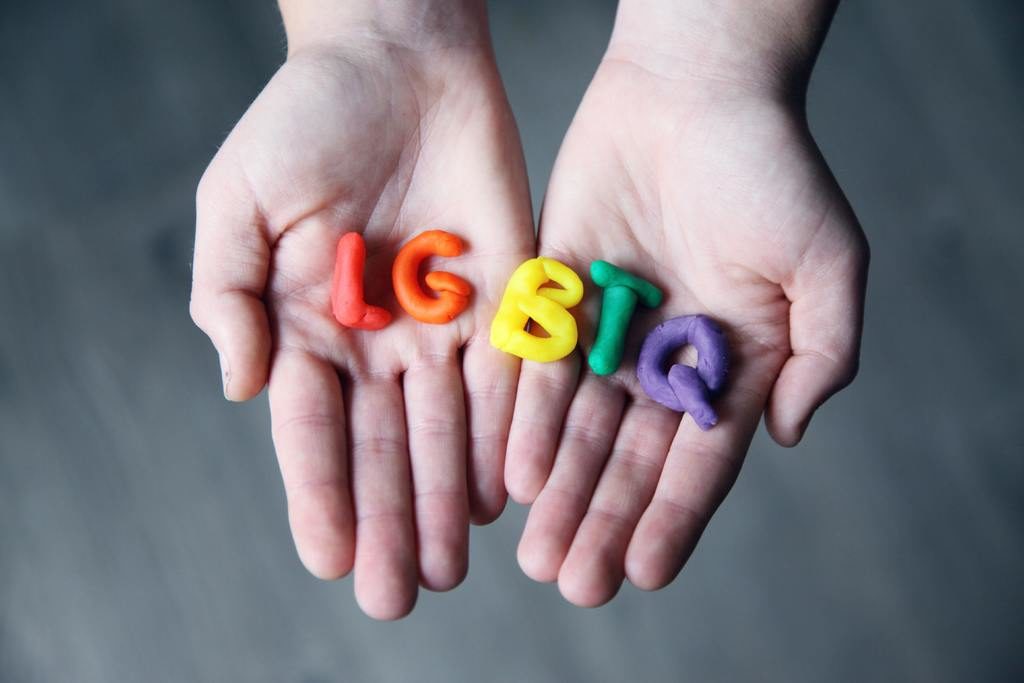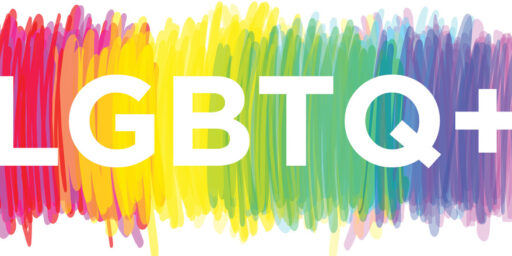Pronouns and Probabilities
Should uncertainty be the default position?

I was driving my 12-year-old to the bus stop* this morning and observed one of three siblings walking towards the stop and casually remarked “I think that’s the girl.” Not because she’s gender-indeterminate but because it was darkish and she was wearing a hat.
My daughter answered, “She’s biologically a girl but I don’t know her pronouns.”
Now, it’s great that she’s aware at such a young age that gender can be complicated and that there are social conventions to signal acceptance of and support for that fact. At the same time, I wonder if we’re not signaling that disparity between a person’s apparent sex and their self-identity is much, much more widespread than it is in reality.
My youngest stepdaughter just started at George Mason and the doors in her dorm all have little whiteboards for people to write their name, preferred pronouns, and fun facts about themselves. That’s quite thoughtful. But, again, it strikes me as perfectly reasonable to proceed, absent contrary evidence, that people who look like girls are probably girls and go by “she.”
____________
A century-old overpass renders the house inaccessible to large vehicles, including school buses, thus her stop is a mile away down a one-lane road with no sidewalks.






What’s important is intent, and willingness to learn from mistakes. Pretty much anybody who has known a trans person for any length of time, especially if they knew them both pre- and post-transition, will have accidentally misgendered them at some point. People make mistakes. You acknowledge the error and try to do better next time. It is *intentional* mis-gendering that is an issue, not accidental or unintentional.
The world evolves.
To lose a tiny bit of convenience in order to make an entire population of people feel more comfortable and accepted is a small tradeoff in my view.
I generally default to the singular they now unless I specifically know what pronouns the person in question prefers
Personally I don’t think it’s my business to tell other people what pronouns to use when discussing me in the third person, that’s their word choice to make, not mine. If a writer or speaker makes a choice that confuses people, again, that’s on them, they’re not my sock puppets, I’m not responsible for their word choices.
As for the singular they, write me a two page action scene – not script, that’s cheating – involving at least three people of mixed genders using the singular ‘they.’ Show me how that works, and I’ll think about it. But lacking proof to the contrary my sense is that it doesn’t do the job.
@Michael Reynolds:
Write us a two page action scene – not script, that’s cheating – involving at least three people who identify as male using ‘he’. I guess gendered pronouns don’t do the job either.
Well, James, your daughter is thinking about what other people might want or need. I think as her father, that’s something you might want to celebrate. Good job!
My sense of the rate of trans people is that it’s something like 1 in 1000, though some have claimed its as much as 1 in 500. Even at 1 in 1000, it’s quite likely that there is someone trans at her school, and therefore it’s something to consider. I mean, it’s quite different than learning the proper way to address the Queen or the Pope.
@Tony W:
I don’t know what that means, to be honest.
I fully agree with @Jon that we should endeavor to call people by their preferred pronouns and that people should be gracious about misunderstandings. But I would think far more people would be made uncomfortable by being asked their pronouns, or even being referred to as “they/them,” than by assuming that those presenting as male go be “he/him” and those presenting as female go by “she/her.”
@Jay L Gischer: Since it’s a secondary school, combining grades 7-12, and rather large (4000ish students), I’m quite sure there are a number of trans or nonbinary students as well as a larger number who are simply uncertain about their gender identity. That she’s aware of this and respectful of it at age 12 is indeed a good thing. I just question whether we should really be teaching kids that the default assumption is that people’s gender identity is not aligned with how they present.
I really don’t see a problem here.
I definitely see a problem here.
Mine would be blank.
Oh yeah, GET OFF MY LAWN!
@Stormy Dragon:
Dude, don’t even. You know how many action scenes I’ve written? Hundreds. In writing an action scene, clarity is everything. Switching back and forth between singular they and plural they is the opposite of clarity. Pick another word to use, make one up.
Like I said: show me. There’s no character limit on comments. Show me.
After 6 years of randomly being called he and she*, I find the kerfluffle to often be overblown. If a mistake is made, correct it and move on.
One of my duties at work is to answer Reception overflow calls. I don’t have the fancy software that Reception does, so I have to look up extensions in the online employee directory. I’ve changed the way I speak to get around the pronoun issue. I used to say “Just a second while I look up his extension”. Now I say “Just a second while I look up that extension”–no mention of the person at all.
============
* In spoken Chinese, there’s one word–“ta”–which means he, she, and it (they don’t have him/her). The possessives and plurals are all the same, too. Not being used to different pronouns for the three, Chinese speakers constantly mix up he and she.
@James Joyner: Sometimes when people, often but not always young people, adopt a new ethos, they are very enthusiastic about it.
As adults, anyway, most trans people I know about try to give some signal of their gender in clothing, hairstyle or speech.
In my generation, it was a grave insult to ask someone if they were a boy or a girl, and as a skate boy, handing out gendered skates at a roller rink, I would go to great lengths to avoid the question if I couldn’t tell immediately.
So that’s a big, big change in and of itself. It’s fine to ask a young person their preferred pronoun, and that covers those situations where you can’t just read their gender.
Thou dost assume too much. Teenagers rarely listen to adults, especially on issues of culture. (I know I didn’t) This is how they are dealing with the issue and maybe we adults should sit back and learn from them.
Agreed. I’m firmly in the camp of default assumptions based on available evidence, which includes both outward appearance and relevant population statistics. If I’m a tall, overweight white dude wearing khaki cargo shorts and a polo shirt walking around Tokyo, it would be totally reasonable for locals to assume I’m probably a Western tourist rather than a Japanese citizen or permanent resident. If I live in Israel but happen to be Christian, I shouldn’t be surprised or upset when some store clerk in December wishes me a happy Hanukkah (assuming the calendar lines up that year) rather than a merry Christmas, and vice versa if I were Jewish (or Muslim, or Hindu, or whatever) living in an equally majority-Christian country. If I’m an engineer designing a new commercial passenger plane, it’d be professional negligence for me not to design the seating based on the average range of girth and height among passengers rather than a few potential outliers. And likewise, if 99% of the people who wear dresses and makeup in public are biologically female and self-identify as women, it would be silly for me to act like I don’t have enough information to form a reasonable assumption about what pronoun to use for a stranger in a dress.
I know two trans people personally – both have adopted the stereotypical look of their transitioned gender. They both use “she/her” and present as women to a casual observer, who would assume their pronouns are she/her. I think this accounts for the majority of trans people, who identify as and comport themselves as either male or female.
Statistically, the number of trans people in the country is really small and the number of trans people with non-obvious pronouns is even smaller. While I think people should be cognizant that that appearance isn’t dispositive, my view is that it’s entirely reasonable for average people to assume pronouns based on the gender that people appear to be.
@James Joyner:
It seems to me she is specifically not assuming anything, and what’s the problem with that?
@Michael Reynolds:
Or else what? I certainly don’t need your permission to go on using the singular they in my writing, much less complete your BS homework assignment because you think you’re the Lord of How Everyone Else is Allowed to Write
@Michael Reynolds:
I might work on that this evening when I’m home and have some “neural lubricant”
It would be less confusing and memory challenging if someone could come up with a universal prefix and pronoun.
The problem is that it implies – and honestly, in most cases among adults, performatively feigns – far greater doubt/uncertainty than is warranted by the available evidence. It’s akin to the “just asking questions” rhetorical tactic of the Trumpy Right. They’re “just asking questions” about issues that are not really in doubt precisely because doing so suggests there actually is some greater doubt. Likewise, “not assuming anything” about a person’s preferred pronouns based on their outward appearance and the overwhelming population statistics suggests greater doubt than there really is – or put another way, it suggests that trans and other non-gender conforming identity is far more common than it is, which is probably a large part of why some trans activists want people to adopt the no-assumptions approach.
“An afterthought to our friends and a priority to our enemies.”
The Gay movement labored for decades to normalize homosexuality and variant sexual orientation. They found success after adopting a slogan like “Like you, we just want to find love. We aren’t a threat.” Obviously, this doesn’t map one-for-one onto the trans struggle for acceptance.
But I ask you: What would it take to normalize variant gender identity in your mind similar to variant sexual orientation? The problem with your “vanishingly small” minority is that the movement remains a high-priority target for its cultural adversaries. So I’m left wondering what it will take to become something other than an afterthought for allegedly sympathetic souls?
To me, it seems like making more people aware, and earlier, of the nuances is a perfectly reasonable way to normalize/narrow the margin.
@Chris:
Marge Piercy suggested “per” in Woman on the Edge of Time.
@Michael Reynolds:
I’ve been considering adding they/them pronouns to everything at work that allows me to specify them, because neither my gender nor my genitals are any of their business.
Frankly, it would be nice if they would stop obliquely referencing my genitals. Or anyone’s genitals, for that matter. I don’t want to hear that shit. Stop forcing everyone’s genitals down my throat!
Is it also cheating to make the whole thing in the tone of the narrator from the 1960’s Batman show? If the Caped Crusaders are fighting/flirting with the dastardly duo of Catwoman and her youthful non-binary sidekick Kittenperson, all of the colorful sobriquets will really clarify everything.
I am more lost than others here I guess. I still don’t understand nonbinary.
Steve
There’s also the possibility that James’ daughter is deliberately trolling him by being explicit about this, knowing that it seems to raise an eyebrow at the least. Poking the old man is a time honored tradition among youngsters.
Or, perhaps she/they is testing the waters to see how the parental units will feel about them changing their pronouns…
@steve: There are, for instance, certain situations where a person is an XY, but for some reason, the development of male characteristics is blocked.
https://www.mayoclinic.org/diseases-conditions/ambiguous-genitalia/symptoms-causes/syc-20369273
There are parallel developments in identity. It is surprising, but it seems pretty solid, that one’s sense of one’s gender is baked in to a brain somehow.
So, how does a person understand themselves in this situation? They do lots of different things, most of them aren’t super comfortable for them, but they do the best they can.
This is odd territory for me. It seems as though something about our gender is baked in, even though the methods (dress, hairstyle, speech, mannerisms, etc) to convey that inner sense of our gender is defined culturally. Like completely. Pink and blue are arbitrary choices, and everyone recognizes that.
So, the thing is, people use these signals with a varying intensity. Some are all-in on “Female” others are maybe only 60%. Some are all-in on “Male” but others maybe aren’t so much. I am maybe 20% ambiguous, and that’s mostly because of my speech. I have a fairly high tenor and speak in a way that is a bit demure. Most of the time. I have been misgendered on telephone calls, for instance. I’m sure if you think about it, you can recognize people who are more of a gender than others. So the “non-binary” person is someone in the middle here, that only has maybe 40% male.
@steve:
One way to look at gender is that it represents two different “interfaces” for how someone interacts with the rest of society, one called “male” and one called “female”. Most people have a strong preference for one over the other. Non-binary refers to the people that don’t have a static preference for one or the other: some like mixing and match from both interface, some switch back and forth situationally, some find that neither really works for them and are trying to come up with a third option that works for them better.
@steve: I don’t really understand binary. How is it that your genitals — whether you are an innie or an outie — determine so much of how people interact, their societal roles, their friendship groups, their interests…
I’m a dude. I have dude parts, and I do dude things, but I don’t get it — it seems like a pretty minor difference that only directly affects a small number of people around you. (And, as a bi/pan/whatever dude, even those differences seem pretty irrelevant… you can work with what you’ve got, and if you feel a need to have kids, there are options)
And yet, through either nature or nurture, I am very clearly a dude. Why is binary the default? Baffling.
Do I just glom onto it because I was assigned dude at birth, and it’s clearly the better choice (less discrimination, I don’t have to do much with my hair, I make more money…)? Maybe.
I used to be skeptical of preferred pronouns but now use them if requested. It’s a small thing and it makes people feel accepted. And I’ve found that if I occasionally make a mistake, they’re usually forgiving (e.g., I mistakenly called a student “she” in class, corrected myself and then after class they said it was fine; they knew I wasn’t being a jerk).
That being said, I think it’s reasonable to assume pronouns in the absence of information given that something like 95+% of people use traditional ones.
When I was running errands after work, I saw two “yoots” (Did you just say “yoots”?) walking down the street–short hair, dressed in (ugh! “fashionably torn”) jeans and plain t-shirts. And a couple couple thoughts popped into my head.
In my experience–which isn’t extensive, but, given the circles I move in, almost certainly more than the average person–those who are insistent about pronounce are primarily MtF (or those who are genetically XY, regardless of gender identity). FtM (or those who are genetically XX, regardless of gender identity) tend to be less concerned about the pronouns and more concerned about attitudes.
This is, I’m fairly certain, because American (and, to some extent, “western”) culture has never really had an issue with tomboys or “masculine” women–especially in rural environments where women work the farms just like the men.[1][2][3]
They do, however, have serious issues with “feminine men”.
It’s my guess that XY tend to insist on she/they in order to not be seen as “girly men”. It’s better to be “female” or “other” to avoid the BS.
==========
[1] When I was touring as a stagehand this really hit me. Once we got out of the mid-west, the number of women stagehands plummeted–with zero in many cities. I’d ask “Where are the women? Aren’t there any women on the crew?” If I got an answer other than blank stares, it was “umm… working wardrobe, of course.” Because, y’know, women do the sewing, not the hammering. The blue-state urban areas were far more segregated by gender than the red-state “rural cities”.
[2] In farm country, a “masculine” woman is frequently seen as more attractive than a “girly” woman. You drink beer, watch football, go hunting and fishing, can toss hay bales and calves with equal ease, look great in an old pair of jeans, and don’t come running to me when some asshole gets in your face (because you already knocked him to the floor)? Damn, girl! Will you marry me??
[3] If we’re ever sitting down over drinks, ask me about Jerry Falwell Jr. and “the all girl crew”
@Michael Reynolds:
You’ve been shown.
In spoken Chinese, every pronoun is exactly the same. There is absolutely zero differentiation of gender–or even being human–without using non-pronoun information.
Ta = he/she/it
Ta de = his/hers/its
Ta men = multiple hes; shes; its; hes and shes; hes and its; shes and its; or hes, shes, and its.
Ta men de = Something belonging to multiple hes; shes; its; hes and shes; hes and its; shes and its; or hes, shes, and its.
If 1.5 billion people can manage to do it for six thousand years, I’m going to say it’s probably a settled issue.
I’ll call people whatever they want to be called. Who cares? Trump is trying to destroy American democracy, his minions are pledging to Jan 6 insurrection flags, but discomfort with LGBT stuff is what straight men are fixated on?
Straight guys will soon be producing more gay content than gays are. Good grief.
@Mu Yixiao:
Related, on the whole “Happy Holidays” vs. “Merry Christmas”, I don’t really care which people use, with the exception of the small subset that say “Merry Christmas” the way most people would say “F*** you!”
Weird how Michael Reynolds doesn’t drop a two-page action scene in the comments as asked. It’s almost like his request is bullshit.
You’d think he’d just pick a random book he’d written, grab a few pages, and post it. At worst, transcribe it if you don’t have an old copy. But he doesn’t. It’s such an easy way to prove his point, but he doesn’t do it.
@Michael Reynolds:
I have no clue if it’s “two pages”, but… here you go.
Please let everyone know if you aren’t able to follow who is who without gender-specific pronouns.
=============
Dre pushed the blanket of their shoulders, adjusted the position of their rifle, and settled closer to the window to get a better view of the confrontation below. It was a minor skirmish between four Hrak, nothing the Imperial sniper had to worry about–but it piqued their interest.
Dre had developed a Platonic empathy for the Hrak since they first encountered the species. The notion of a culture without gender was deeply impactful. Six distinct “sexes”, but no gender. That felt right to their own sense of identity.
The only way to tell the sex of a Hrak was through genetic testing. Physically, behaviorially, the were all “the same”. Culturally, however… that was another story.
From this distance, Dre couldn’t identify the specific tribal markings, only the colors. Their sniper training, however, caused them to automatically labele each individual in the group with nickname.
Skinny
Squirmy
Dumpy
Easy
Easy was obvious. Picking them off would be like target practice–especially with the sunlight hitting them from behind the sniper, and not a whiff of a breeze.
Squirmy kept gripping their bag and looking around–as if their bag was either meant to be kept from prying eyes, or about to be stolen.
Skinny and Dumpy? Well… they were just “what it says on the tin”.
Skinny and Squirmy wore the black of the bureaucracy. By the cut of their fabric, they were mid-level bureaucrats at best. Dumpy and Easy wore the browns and tans of the working class, but the way in which they wore it suggest to Dre that they were religious caste.
The four Hrak were engaged in a kurfluffle that the Imperial sniper had seen far too many times in their deployment on this gods-forsaken planet. The natives would bump into each other on the road, or in the market, or wherever–their conveniently color-coded clothes displaying to everyone whose side they were one. There would be puffing of chests and waving of hands, and then they would move on… each one believing that they had gotten the better of the situation.
Dre leaned back from the window. It was something they’d seen too many times to be worried about. As their head just rested against the wall, the realization of what they’d seen flashed across their eyes…
Squirmy had pulled a red crystal from their bag. Dre knew that crystal. They’d seen it before–but never in person, never in a live scenario. No one had. The last thought that crossed through their mind before the fireball evaporated the city was… peaceful.
Had another thought and want to add that at her age, she is dealing with folks who haven’t decided yet. They are ambiguous and she is probably being respectful of that.
First off, it’s not a problem and 2nd of all it implies nothing of the sort. She is waiting for more evidence. That is not a problem for her, question is why is it a problem for you?
40 years ago I had a discussion with a somewhat homophobic friend. In that discussion I asked him, “What do you care what goes on behind closed doors?” He realized, he didn’t. As far as I am concerned, this is no different.
@steve: If it makes you feel any better, you don’t have to.
FTR, I don’t understand it either. But then I don’t need to. I just have to give people the respect they deserve.
@Stormy Dragon:
Oh… bless your heart
😀
@Mu Yixiao:
Is there an editor in the house?!
@steve:
I agree with some conservative stuff and some liberal stuff.
I like football and rom-coms
Ford and Chevy both make good trucks
The Packers and the Bears…. nope. That’s a bridge too far.
“Non-binary” essentially means “Not one or the other, but maybe some of both or maybe something in between.” I may not grok it, but I understand the concept.
@James Joyner:
Why on earth would you think that? Serious question.
@DrDaveT: Trans people make up a tiny fraction of society. Much smaller, I’d wager, than cis people who are insecure about their manhood/femininity/attractiveness/whathaveyou. If you go up to, say, a morbidly obese woman and ask whether she’s a she, she’s likely to take it as an insult, not a kind acknowledgment that she may actually prefer a different pronoun.
This is likely just an age thing and, over time, conventions will arise over this. But, right now, it seems obvious to me that we should assume those who present as males are “he” and those who present as females are “she,” and reserve asking for pronouns for truly ambiguous cases. And, absent evidence of ill intent, those who go by a different pronoun than would seem obvious should simply say, “I prefer ‘xe'” and the interlocutor would politely go along with that.
@DrDaveT: Why? Rational understanding of both demographics statistics as well as ordinary society outside of woke Lefty culty circles it should be rather obvious.
@James Joyner:
In your scenario, you have had no interaction with the woman other than pronouns. Also, why is she morbidly obese?
I’m sticking with my theory that your “daughter” is sounding you out on how you will feel when they change their pronouns. Just keep saying “I’ll love you no matter what” and it will all be fine. “I miss my daughter” should be immediately followed by “but I am delighted to get to know my… um… childperson? Son? Oh god, what the hell do you mean your pronouns are crow/crowself? Never mind, I’m glad to finally know my Corvid.”
“They” as singular pronoun has a rich and ancient tradition in English. Dating back to at least 1375.
Were our brains bigger and more accommodating and more adaptable then?
Back in 1984 The Replacements released a song called Androgynous.
You could hear that song today and only need to subtly mess with a line or two to make it fully PC compliant with 2021 acceptance orthodoxy. 37 years ago.
Good song. Worth a listen.
@de stijl: Almost invariably for people whose gender is unknown, though, and in the rare examples where the gender is known, the identity of the person is not.
From Billy Bob Shakespeare’s Comedy of Errors:
The man is unknown, and he may in fact be using man as “person” (mankind does not just mean the dicked portion of humankind — please pronounce “dicked” to rhyme with “wicked,” as Shakespeare would have done), and Shakespeare often bends language for meter and internal rhyme schemes (some of which no longer rhyme)
The modern singular-they for a known person is new.
I’d rather there be another pronoun for a known gender that is neither male nor female, so that singular they can continue to just mean “it was likely one person, but I don’t know the person’s gender or it isn’t relevant”.
Seems a little rude to suggest that a known person’s gender is unknown (and unknowable).
But if non-binary folks are fine with it, eh, I’ll get over it.
Perhaps they like the implication that their genitals will forever remain a mystery. Schroedinger’s Genitals, a wave form resolved for only a select few.
(The “singular-they has been used this way for centuries” argument always triggers my “no, someone is wrong on the internet” instinct)
@Gustopher:
Tomorrow who’s gonna fuss?